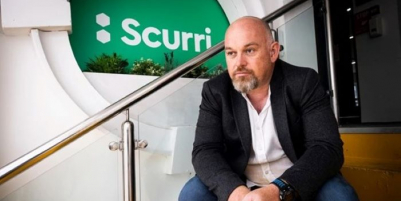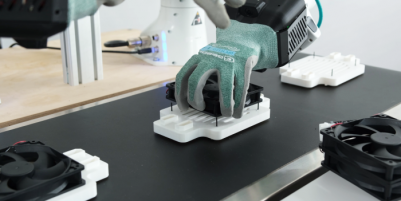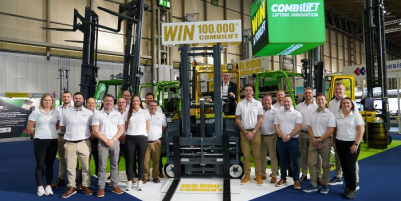-
Rite-Hite unveils new range of hydraulic kits to upgrade and extend dock leveller performance - 2 days ago
-
REWE and Cimcorp automate fresh supply chain for Berlin supermarkets and stores - 2 days ago
-
Q1 – A recovery period or time to fix, switch and scale? - 2 days ago
-
NULOGY’S SHOP FLOOR SOFTWARE TO POWER COMPLETE CO-PACKING’SOPERATIONS - February 13, 2026
-
Why lead generation depends upon good content - February 13, 2026
-
Wallapop and Albatross Sign Strategic Partnership to Bring Real-Time AI Discovery to the Future of Consumer-to-Consumer Commerce - February 12, 2026
-
Thorworld ramp helps Hubergroup to streamline its unloading operation - February 6, 2026
-
TRACKER INNOVATION FROM QUECLINK TO BOOST STOLEN VEHICLE RECOVERY PERFORMANCE - February 4, 2026
-
Flexi Narrow Aisle hits 50! - January 29, 2026
-
DERRY BROS ATTRACTS RECORD NUMBERS OF FREIGHT CUSTOMERS SEEKING CUSTOMS SUPPORT - January 29, 2026
AI for good: Voxel AI tech is saving industrial workers’ lives as it increases funding to $30m with strategic funding round
Voxel brings computer vision AI to security cameras in industrial facilities to prevent accidents and reduce workplace injuries. Fresh $12m strategic investment from global industry leader Rite-Hite will propel Voxel to expand and scale operations globally. With this investment, Voxel has now raised $30m in funding since 2020.
Every year over 340m workers suffer a workplace injury: slips and falls, strains and sprains, vehicle collisions and crashes. Voxel, an AI startup using computer vision to transform safety and operations in the workplace, is today announcing a $12m strategic funding round to improve workplace safety and save lives. The strategic funding round was led by global manufacturing industry leader Rite-Hite with participation from existing investors Eclipse Ventures and World Innovation Lab. This takes total funds raised to $30m since 2020.
In the US, manufacturing, logistics, and physical operations are the lifeblood of the economy, with over 25 million individuals at the frontlines, contributing to 40% of the nation’s GDP. However, with massive output comes the persistent challenge of workplace injuries and operational inefficiencies. Now, artificial intelligence is revolutionizing the field of environment, health and safety (EHS) in industrial operations.
Voxel integrates state-of-the-art computer vision technology into existing security cameras to identify hazards, risky behaviors, and operational inefficiencies across a diverse range of workplaces. Once potential risks, such as near-miss vehicle collisions, blocked exits, improper ergonomics,or spills, are identified, a real-time alert is sent to on-site personnel who can take immediate action, and Voxel’s analytics help sites identify operational inefficiencies and design policies to prevent future issues. These proactive measures allow businesses to significantly reduce worker’s compensation and general liability costs, while improving their operations.
In order to protect workers’ privacy, Voxel’s AI ethics policy means that no facial recognition or identification of individuals is permitted in their systems. Voxel provides its customers with resources for ethically and responsibly implementing AI in the workplace crafted after years of experience developing AI for America’s industrial leaders.
Voxel has had a transformative impact for their strategic partners’ operations, reporting up to an 80% reduction in workplace injuries and substantially improving operational efficiency. Fortune 500 firms like Michael’s, Dollar Tree, Clorox, PPG Industries, Office Depot, and many others are already seeing the benefits of Voxel’s platform.
Alex Senemar, CEO and co-founder of Voxel commented: “AI is saving lives. We’ve proven that our technology has made great strides toward reducing injuries and saving lives. Our approach is going to create worksites where employers don’t have to bargain between meeting safety standards and meeting their productivity goals. The future of work is not just about doing more, but doing it safer in an environment fit for purpose”.
Voxel business highlights (since series A funding round, April 2022)
- The team has grown from 10 people to over 50 employees, who have joined from established industry firms Samsara and Verkada to big tech Google, Apple, and Uber
- Featured in the Fast Company magazine Most Innovative Companies list
- Best B2B Tech Tool of 2023 by Products That Count.
Voxel’s team is led by CEO Alex Senemar, who previously co-founded Sherbit, an AI-powered remote health monitoring system for hospitals (acquired in 2018) as well as co-founders, CTO Anurag Kanungo, who co-founded Sherbit with Senemar, and led the Machine Learning Systems Team at Uber’s Self Driving Unit; Harishma Dayanidhi, who developed self-driving car technology at Uber and Aurora; and Troy Carlson, former software engineer at Google.

































